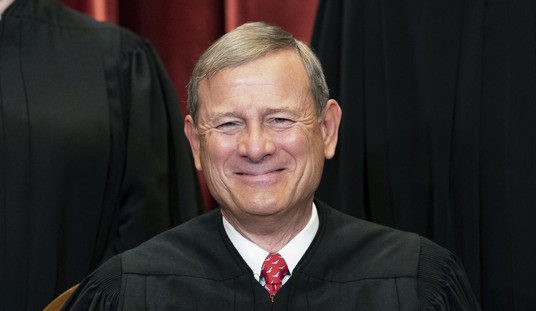As a stall tactic, James Comey’s court filing late yesterday rates as first-class. As a legal maneuver, likely not so much. The former FBI director wants the judiciary to dictate to Congress how it can conduct its own investigations, a request that’s not likely to end well:
Former FBI director James B. Comey is asking a federal judge to quash a subpoena demanding he testify before the House Judiciary and Oversight committees next week and postpone the testimony until that request can be ruled on, court filings show.
In a forceful court filing Thursday, lawyers for Comey wrote that the he was fighting the committee’s bid to force him to testify “not to avoid giving testimony but to prevent the Joint Committee from using the pretext of a closed interview to peddle a distorted, partisan political narrative about the Clinton and Russian investigations.”
Comey and former attorney general Loretta E. Lynch were given subpoenas last week to appear before the committees as part of the committees’ investigation of two politically charged probes into Hillary Clinton’s private email server and possible coordination between the Trump campaign and Russia. Comey said on Twitter that he was willing to testify publicly but would resist doing so behind closed doors.
That’s a strange demand under any circumstances, but especially from a former director of the FBI. Trey Gowdy made this point on CBS’ Face the Nation this past Sunday, saying House Judiciary chair Bob Goodlatte isn’t going to go for a public-only interview for the same reasons Comey’s FBI doesn’t conduct interrogations in public:
REP. GOWDY: But he also is not going to let Jim Comey who by the way the FBI has never conducted an interview in public. Never. And he wasn’t interviewed by Mueller in public. So the notion that Jim Comey all of a sudden loves public interviews he hadn’t done it his entire career. So Bob Goodlatte will decide and it won’t be Jim Comey.
At issue here are two constitutional questions — whether Congress can conduct independent investigations and whether they can set their own rules for doing so. The courts have ruled repeatedly on the legitimacy of congressional subpoenas, and even Comey’s filing acknowledges that much. Robert Mueller’s relying on that legitimacy to charge Michael Cohen with lying to Congress, for instance.
As an independent branch of the government, Congress sets its own rules with the Constitution as its only limitation. While one should never underestimate the potential of a single federal judge issuing an order that is legally unsupportable, there is no constitutional jurisdiction for the courts to dictate the terms under which testimony can be heard in Congress. Either the subpoena is legitimate or it’s not, and if it is, then Congress sets those terms, not the courts. Eventually, this maneuver will fail on separation-of-powers grounds, and likely sooner rather than later.
Comey has to know that this is at best a futile stunt — if he truly wants to testify at all, that is. If Comey wants to run out the clock, though, it’s not a bad strategy at all. Even if he gets slapped down at the district court level, he can appeal to the DC Circuit Court of Appeal, and then to the Supreme Court. By the time he plays out that string, Bob Goodlatte won’t be in charge of the House Judiciary Committee any longer, and Republicans will have lost control of the House. Democrats might well lose interest in Comey entirely at that point, or perhaps provide Comey with the grandstanding platform he wants. All it costs Comey is some attorney’s fees, while Goodlatte loses the most precious commodity he has — time.
Gowdy floated a good compromise in his FTN appearance:
REP. GOWDY: Well, people act differently when there aren’t cameras in the room. Trust me when I say that. There are very constructive interviews when there is no camera. What I would propose – and Bob Goodlatte is the chairman he- he can decide – what I would propose is videotape that interview from pillar to post. Scrub it for classified information in case somebody inadvertently asks or answers and then release it to the public. Release the entire interview but do not make members of Congress question someone that Democrats think cost Hillary Clinton the election. And Republicans have a lot of questions for. Do not ask us to limit 17 months worth of decision making to five minutes of questions no other serious fact finder tries to do it in five minutes. So I don’t know why Congress thinks it can.
MARGARET BRENNAN: Is that a formal offer to Mr. Comey?
REP. GOWDY: Oh if I were the chairman of Judiciary it would be a formal offer. I- I think Bob Goodlatte- Bob Goodlatte hates leaks every bit as much as I do which is why he doesn’t do it.
That would make the most sense. That doesn’t mean Comey will agree to it, of course.
Addendum: Comey’s team will make the argument this afternoon:
CNN: Judge Trevor McFadden has scheduled a hearing for 2pm today on Comey’s motion to quash a House Judiciary subpoena for him to appear behind closed doors next week. Comey argues he is willing to appear publicly.
Comey has been subpoenaed to appear at 10a on Monday 12/3.
— Manu Raju (@mkraju) November 30, 2018
His best outcome would be a TRO. Second-best would be for Judge McFadden to take it under advisement for a few days and ask for a postponement.








Join the conversation as a VIP Member